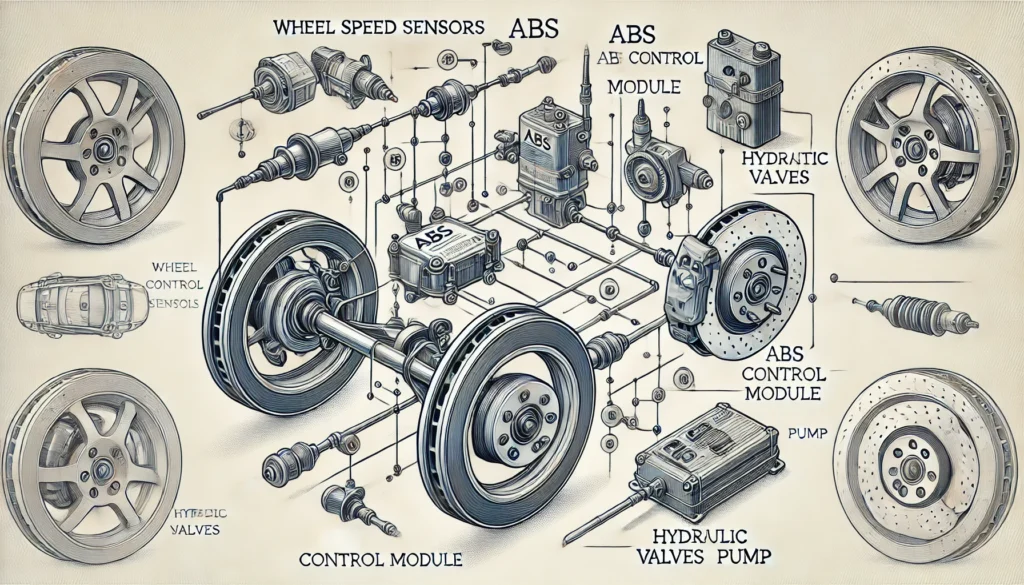The Anti-lock Braking System (ABS) is a crucial safety feature in modern vehicles, designed to prevent the wheels from locking up during braking and maintaining steering control. When the ABS system malfunctions, indicated by the ABS warning light on the dashboard, it raises several concerns about vehicle safety and performance. One common question is whether an ABS fault can cause the check engine light to come on. Understanding the relationship between ABS faults and the check engine light is essential for effective vehicle maintenance and troubleshooting.
Understanding ABS and Its Function
The ABS system includes several key components:
- Wheel Speed Sensors: Monitor the speed of each wheel.
- ABS Control Module: Processes data from the wheel speed sensors and controls the hydraulic valves.
- Hydraulic Valves: Regulate brake pressure to prevent wheel lockup.
- Pump: Restores pressure to the hydraulic brakes after the valves release it.

Understanding the Check Engine Light
The check engine light is part of the vehicle’s onboard diagnostics system (OBD-II). It illuminates when the engine control unit (ECU) detects a problem affecting the vehicle’s emissions, fuel system, or other critical engine components. Common issues that trigger the check engine light include sensor malfunctions, fuel mixture problems, and emission control faults.
Impact of ABS Fault on the Check Engine Light
- No Direct Impact:
- Explanation: The ABS and the engine control systems operate independently. The ABS is specifically designed to manage braking performance, while the check engine light monitors the engine and related systems.
- Scenario: An ABS fault does not directly cause the check engine light to come on. Each system has its own set of indicators and diagnostic trouble codes (DTCs).
- Indirect Impact Through Electrical Issues:
- Explanation: While an ABS fault does not directly trigger the check engine light, underlying electrical issues could potentially affect both systems.
- Scenario: A major electrical fault affecting the vehicle’s power supply could impact the ABS and the engine control systems, potentially causing both warning lights to illuminate.

- Associated Sensor Issues:
- Explanation: Some sensors, such as wheel speed sensors, might share data with multiple systems, including the ABS and the engine control unit.
- Scenario: If a sensor fault affects both the ABS and the engine control systems, it could potentially trigger both warning lights.
- Communication Errors:
- Explanation: In rare cases, communication errors within the vehicle’s network could cause multiple warning lights to illuminate.
- Scenario: Faulty wiring or a malfunctioning control module could lead to erroneous signals, triggering both the ABS and check engine lights.
Steps to Diagnose and Address ABS and Check Engine Light Issues
- Use an OBD-II Scanner:
- Steps: Connect the scanner to the vehicle’s OBD-II port to read error codes related to both the ABS and the engine systems. These codes help identify specific problems.
- Importance: Accurate diagnosis is key to addressing faults effectively.
- Inspect Electrical Connections:
- Steps: Check all electrical connections, including ground connections, for signs of corrosion or looseness. Clean and secure any faulty connections.
- Importance: Good electrical connections are essential for the proper functioning of all vehicle systems.
- Check Sensors:
- Steps: Inspect sensors that could affect both systems, such as wheel speed sensors and other relevant components. Replace or repair faulty sensors.
- Importance: Ensuring sensors function correctly can prevent multiple system faults.

- Consult a Professional Mechanic:
- Steps: If you are unable to diagnose or repair issues yourself, seek assistance from a certified mechanic. They have the expertise and tools to address complex problems.
- Importance: Professional diagnosis and repair ensure that the vehicle is safe and reliable.
Conclusion
An ABS fault does not directly cause the check engine light to come on. However, underlying electrical issues or sensor problems could potentially affect both systems, leading to both warning lights illuminating. Regular maintenance and prompt attention to warning lights are crucial for vehicle safety and performance. Using an OBD-II scanner and consulting a professional mechanic can help diagnose and address these issues effectively.